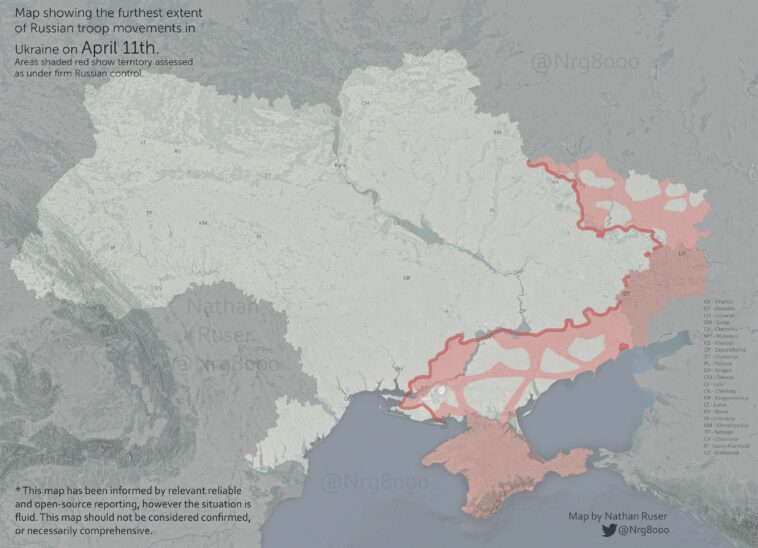Russia nearly ready for new offensive in Donbas, said spokesperson of Ukraine’s Defense Ministry Oleksandr Motuzyanyk. Russia regroups troops to advance in the eastern operation zone, reinforces the command and supply systems, the spokesperson said. Russia’s effort is to defeat Ukraine’s Joint Forces, take full control of Donetsk and Luhansk regions, and secure a land corridor to temporarily occupied Crimea.
General Dvornikov who ran operation in Syria, Chechnya appointed to head Russian force in Ukraine. What to expect from the big battle for Donbas. Director of the Defense Express consulting company Serhiy Zhurets explained Dvornikov’s campaign tactics in Chechnya, and later in Syria.
“When [Russia’s] advance met resistance on the ground, they used artillery and aviation to completely erase the areas of alleged civilian resistance. They used chemical weapons in areas where resistance continued. That’s primitive operation of the war machine.”
Russian army raped children in Kyiv region. In Kyiv region, particularly in Bucha and Irpin, the Russian troops raped children during their occupation of the area, Lyudmila Denisova, Ukraine’s Parliamentary Commissioner for Human Rights said.
These are the facts she quoted. In Bucha, a 14-year-old girl became pregnant after she was raped by five Russian soldiers. In Bucha, an 11-year-old boy was raped by Russians in front of his mother who was tied to a chair and forced to watch as it happened. In Irpin, a 20-year-old woman was raped by three Russians “in all possible ways at once”.
“The level of brutality of Russia’s army of terrorists and executioners knows no bounds – raped children. There is no place on earth or in hell where Russian criminals can hide from retribution,” Denisova wrote.
Rape is strictly banned by Article 27 of the 1949 Geneva Convention relative to the Protection of Civilian Persons in Time of War, she reminded.
Denisova also urged the UN Commission for Investigation Human Rights Violations during the Russian Military Invasion of Ukraine and the expert mission set up by the OSCE participating states in accordance with the Moscow Mechanism to take into account these facts of Russian war crimes in Ukraine.
War to shrink Ukraine economy by 45 per cent. Russian invasion is to shrink Ukraine’s economy by an estimated 45.1 per cent this year, the World Bank said in the War in the Region economic update.
Russia’s invasion has shut down half of the country’s businesses, the World Bank said. The loss of access to the Black Sea cuts off half of Ukraine’s exports. Russia’s economic output is projected to contract by 11.2 per cent in 2022 because of the sanctions and the war.
Podcast Explaining Ukraine: It’s Time to Stop Admiring the “Russian Soul”
A mysterious “Russian soul” has been an object of international admiration for centuries. We explain why this admiration is naïve. Russia’s love for “wide” horizons, “borderless” thinking and “extreme” emotions has deprived it of key elements of Western civilization: the idea of balance and proportions. In the Russian culture, the distinctions between good and evil are difficult to draw. — Hosts: Volodymyr Yermolenko, Ukrainian philosopher and journalist, chief editor at UkraineWorld.org, and Tetyana Ogarkova, Ukrainian scholar and journalist who is in charge of international outreach at the Ukraine Crisis Media Centre. Listen to the episode.
Ukraine in Flames #30. How did the Russian-Ukrainian war become possible?
Putin may have started the war, but he is not the only one supporting it. In fact, 74% of the Russian population support the war, and 78% agree with Putin’s decisions. It is a collective passion of the Russian people to destroy Ukraine. Russians believe that historical, social, political and economic connections that the Russian Empire and the USSR have entangled its neighbors in are still relevant and should be respected.
To deal with the totalitarian past, Russia has developed a mythology of past victories. It refused to process its traumatic experience, which led to resentment, revanchism and militarism. Russia’s self-image heavily relies on re-winning battles of the past, ritualistic victory frenzy, and the transformation of dead tyrants into ‘effective managers’. Meanwhile, Ukraine has worked through its traumas. The sovereignty, anti-colonial spirit and European ambitions of modern Ukraine betrayed the past-oriented Russian world.
As a result, the Ukrainian ‘little brother’ became an enemy and needed to be subdued or punished. We are reflecting on further reasons for Russia’s war against Ukraine in Ukraine in Flames #30.
Speakers:
Dr. Hanna Shelest, Editor-in-Chief, UA: Ukraine Analytica
Pylyp Illienko, film producer, Head of the Board of the Ukrainian Film Academy
Vita Dumanska, leader of the “CHESNO” civil movement
Larysa Yakubova, phD in historical sciences, Corresponding Member of the National Academy of Sciences of Ukraine
Ukraine in Flames #31. What military support does Ukraine need today?
Ukraine in Flames #32. How Russia is killing the future of Ukraine – children




